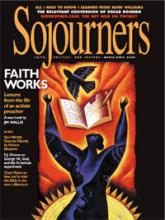It had the marks of a standard Hollywood gala: People jostling glasses of white wine as they elbowed through the crowd, hors doeuvre trays bulging with cheese and colorful slices of fruit.
But then the voice of Richard Mouw, president of Fuller Theological Seminary, sounded over the gathering as he welcomed guests who had come not to laud the entertainment industrys latest box-office triumph, but to ask how film can help Christians understand "the story we have to tell."
Fuller is one of the key sponsors of the six-year-old City of the Angels Film Festival, which was held in Los Angeles in November. With the appropriately titled theme "Embracing Apocalypse: Visions of Faith and Fear," the event showcased eight feature films and screened eight shorts and documentaries. Other sponsors included Catholics in Media Associates, Showtime, and the Odyssey Television Network.
By bringing together theologians and media professionals who "see the arts as a way to communicate our most transcendent longings," said festival chair and independent television producer Cecilia González, organizers want to promote dialogue about cinemas power to inspire spiritual and social reflection. "Great films deal with great questions," she said.
The festival opened with director Frank Capras 1937 classic Lost Horizon, which probes the nature and possibility of an ideal society through the story of crash survivors in the Himalayas who take refuge in the paradisiacal "Shangri-La."
After three days of screenings, the festival wrapped up with Stanley Kubricks 1964 Dr. Strangelove, the unnerving and darkly comic vision of a wildcard U.S. Air Force general who single-handedly initiates an American nuclear attack and sets in motion an irreversible Soviet "doomsday" machine.
Read the Full Article
